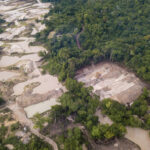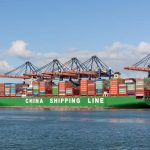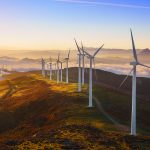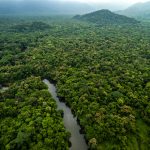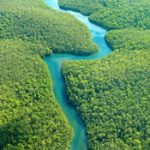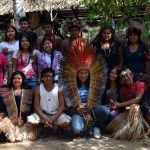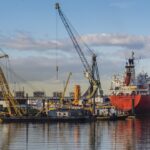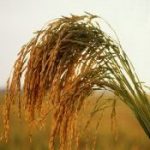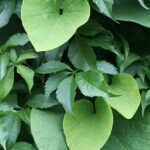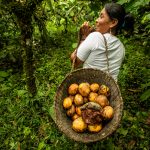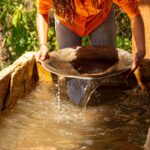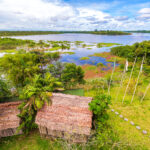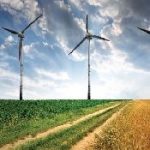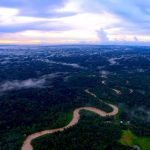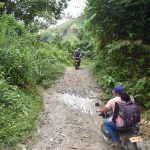
Organized crime has been laundering its gold assets in Ecuador. The mechanism is the signing of operation and mandate contracts between mining owners and private actors. Thus, contractors exploit and export gold and minerals, with marketing licenses, without the need to have mining concessions, amid the lack of control of the State, despite the fact that the mining cadastre has been closed since 2018.
Techgolden, which obtained 52 million dollars from exports of gold and concentrate to the U.S. and China in 16 months, has two contracts with a firm of alleged drug traffickers, which sold it the mineral.
The dirty gold also leaves in small planes from towns in the south of the country.
Los Lobos, Los Choneros, the Comandos de la Frontera, Los Trujillanos and Mexican armed forces operate on the Peruvian-Ecuadorian border in illegal mining and other criminal activities.
Extractive economies in Latin America, such as mining, fishing, and logging — where legal and illegal activity often intersect — along with crimes like wildlife trafficking and drug production, pose some of the gravest threats to the survival of the region’s ecosystems and the people who defend them. This article examines the main criminal economies driving the degradation of forests, rivers, and oceans across Latin America and the Caribbean: illegal gold mining, drug trafficking and its infrastructure, timber trafficking, land grabbing, illegal/unreported/unregulated fishing, and wildlife tracking
New roads and riverways integrating the Brazilian Amazon and ports on the Pacific coast of South America (Peru, Ecuador) are expected to be announced in 2025, reducing shipment costs to supply China.
Brazil’s plans to build ports and roads to help move grains, beef and iron ore from the rainforest echo a development vision that dates back to the military dictatorship in the 1960s and 1970s.
Environmentalists warn the new routes boost deforestation and encourage land-grabbers and ranchers to keep exploring the Amazon as a commodity hub.
The Inter-American Court of Human Rights found Ecuador violated the rights of uncontacted Indigenous groups by permitting oil drilling in Yasuni National Park.
The ruling mandates Ecuador to prevent oil expansion in these territories and take steps to protect uncontacted peoples from external threats like illegal logging.
The decision is the first by an international court on the rights of Indigenous communities living in voluntary isolation.
FSC and Assurance Services International (ASI) announce the launch of the Teak Corridor transaction verification (TV) loop. FSC and ASI have conducted TV loops on FSC-certified high-value timber species like teak (Tectona grandis) in the past. The previous teak TV loop, along with other available information, indicate the possibility of integrity risks in the segregation of FSC-certified and non-certified teak in the supply chains.
Therefore, FSC recommends certificate holders with teak in their certification scope to apply additional due diligence in selecting their teak suppliers and following FSC rules to ensure that the teak products they purchase are legitimate and within the FSC certificate scope of the seller.
In order to construct their wind turbine blades, energy giants in the U.S., such as GE Vernova, and leading manufacturers in China, like Goldwind (金风科技) and Mingyang (明阳风电), appear to have relied for years on balsa wood sources that include timber stolen from protected forests and the exploitation of Indigenous communities in the Amazon. This report reportedly connects the dots between deforestation, human rights violations, and some of the world’s leading wind turbine blade manufacturers.
The Team Europe Initiative (TEI) supports capacity building and provides technical support on traceability
systems, geolocalisation and legality to partner countries, through a specialized Technical Facility and
programmes such as SAFE and AL-INVEST Verde. TEI programmes are active in Brazil, Colombia, Democratic
Republic of the Congo, Ecuador, Ethiopia, Indonesia, Kenya, Nigeria, Peru, Tanzania and Zambia. Burundi will
soon join the SAFE programme.
On September 19, 2024, the United States and Ecuador convened the inaugural meeting of the of the Trade and Environment Committee (Committee) under the United States-Ecuador Trade and Investment Council. The Committee, chaired by Assistant United States Trade Representative for Environment and Natural Resources Kelly Milton, exchanged views and priorities regarding trade and environment policies, including addressing the climate crisis, and finalized the Committee’s work plan, which establishes a series of in-depth discussions to deepen our bilateral trade relationship. The Committee also shared perspectives and experiences on forest sector governance and combating illegal logging and associated trade.
Indigenous communities in Latin America face extinction due to forest fires, many of them caused by illegal land conversion. This loss of culture is not unique to Bolivia. In Brazil, the Kayapo and Yanomami peoples have faced similar struggles as deforestation and illegal mining force them from their lands. The Asháninka and Awajún indigenous groups in Peru have been severely affected by forest fires in the Ucayali and Loreto regions, often caused by illegal logging and mining. In Colombia, deforestation and illegal land clearing in the Amazon have reached record levels, contributing to rising forest fires. The Tikuna and Huitoto people, who live deep in the Amazon, see their ancestral lands reduced to ash. In Ecuador, the Waorani people have been displaced by fires and oil extraction.
According to the Indian Centre for Science and Environment, the country’s 2022 demand for timber was 63 million cubic metres—30 million cubic metres for domestic production and 33 million cubic metres from imported sources.
Uruguay is India’s top market for sawlog, with India’s Ministry of Commerce and Industry reporting that Uruguyans account for more than 20% of total trade for the first six months of 2024 (487,700 cubic metres) ahead of Australia (14.4% or 347,600 cubic metres), Ecuador (12.1% or 293,300 cubic metres), Argentina (9.1% or 213,700 cubic metres) and the United States (7.6% or 193,000 cubic metres).
India has emerged as one of the United States’ most important export markets, with 116,000 cubic metres of softwood lumber shipped from the West Coast to India last year alone. Already its fastest-growing hardwood market, the US is capitalising on India’s construction industry and, in the process, making up for a drop in Chinese demand—with total lumber exports almost tripling for the first six months of 2024 over last year.
While import volumes remain lower in 2024 compared to 2023, India is competing with China to become the world’s largest consumer market for structural timbers. The Modi Government is grappling with a 19 million-unit housing shortage, which will double over the next five years.
Fuelling India’s demand for roundwood is a decision made in 2020 to reverse a 27-year ban on using timber in public buildings.
A series of recently published data is shining a new light on patterns of deforestation in the Amazon, revealing where crops, cattle ranching and mining are encroaching on the rainforest.
Some of the crops are well-known drivers of deforestation, such as soy, but lesser-discussed crops are also present in the region, such as rice and sorghum.
Illicit coca cultivation expanded in the Amazon basin and the Andean region the United Nations International Narcotics Control Board (INCB) indicated in its Annual Report 2023 released this March. This expansion, the report indicates, significantly impacts local ecosystems and biodiversity, leading to substantial deforestation, soil degradation, and loss of flora and fauna diversity.
Illicit drug production indiscriminately uses chemicals to boost harvests, leading to widespread contamination, while vast areas of forests are cleared to expand cultivation — giving rise to narco-deforestation.
Ecuador has introduced new traceability guidelines to guarantee the origin and quality of its agricultural exports, in hopes this will help the country’s exports comply with the EU Deforestation Regulation. In 2023, it exported almost US$2bn of agricultural products to that market, the main ones being bananas, cocoa beans, fresh flowers, coffee, broccoli, pineapples and pitahaya, amongst others.
Each day, some 100 tons of raw material, use to process gold, extracted from Peru is smuggled into Ecuador along a route in the Amazon that illegal miners control in cahoots with transnational criminal organizations, Peruvian daily El Comercio reported in a recent investigation. The route starts in the province of Condorcanqui in Peru and ends in the province of Zamora Chinchipe in Ecuador.
“In these Amazonian border areas, drug trafficking profits are often reinvested in illegal gold mining,” Bram Ebus, a consultant with the Belgium-based nongovernmental organization International Crisis Group, told Diálogo on March 30. “Gold is a supremely useful commodity for laundering drug trafficking assets, because illegally sourced gold is very easy to legalize within the illicit chain.”
MAAP documents alluvial (mainly gold) mining in the Ecuadorian Amazon, specifically in the area around the Punino River. The vast majority of the detected activity is illegal mining, as it is outside the limits of the areas authorized for mining.
For the past 11 years, Global Witness has documented and denounced waves of threats, violence and killings of land and environmental defenders across the world, and 2022 marks the beginning of our second decade documenting lethal attacks. The world has changed dramatically since we started documenting these in 2012. But one thing that has not changed is the relentlessness of the killings.
Last year, at least 177 defenders lost their lives for protecting our planet, bringing the total number of killings to 1,910 since 2012. At least 1,390 of these killings took place between the adoption of the Paris Agreement on 12 December 2015 and 31 December 2022.
Amazon nations have attacked in a joint declaration the “proliferation” of environmental rules in trade, echoing a growing backlash against new EU deforestation requirements.
The final document does not single out the European law specifically, but it condemns “the proliferation of unilateral trade measures based on environmental requirements and norms which constitute trade barriers”.
Roads constructed for the oil industry have facilitated timber extraction in the Amazon for decades. Recent deforestation alerts show that this problem is ongoing.
In Via Auca, one of the most deforested areas of Ecuador’s Amazon, farmers are turning to planting oil palm under the contract farming model.
On the Via a Loreto, Indigenous Kichwa people are focusing on cultivating balsa trees used for a material that has been in high demand in the wind energy industry for the last five years.
Mongabay has begun publishing a new edition of the book, “A Perfect Storm in the Amazon,” in short installments and in three languages: Spanish, English and Portuguese.
Chronicling the efforts of nine Amazonian countries to curb deforestation, this edition provides an overview of the topics most relevant to the conservation of the region’s biodiversity, ecosystem services and Indigenous cultures, as well as a description of the conventional and sustainable development models that are vying for space within the regional economy.
A series of reports have shown that deforestation caused by gold mining is escalating in the Ecuadorian Amazon. Protected areas and indigenous territories such as Podocarpus National Park, Cuenca Alta del Río Nangaritza Protected Forest, and Shuar Arutam Indigenous territory have been highly susceptible to these activities, which are now beginning to affect the Cofán – Bermejo Ecological Reserve.
Colombia and Ecuador are implementing a system designed to alert about risks of violence against residents who live near the border, many of whom are Awá Indigenous people.
Since last August, thousands of Awá have been forcibly displaced or suffered threats, intimidation, torture or forced recruitment by organized crime groups participating in drug trafficking and illegal mining.
Ecuador is the world’s biggest exporter of balsa wood, most of it shipped to China. Indigenous communities in Ecuador’s Pastaza River Basin say balsa is being logged illegally in their territories. Sources say balsa logging is damaging the ecological integrity of the region and hurting Indigenous communities. The problem has reportedly spread to neighboring Peru, where Indigenous communities accuse Ecuadoran balsa loggers of felling commercially valuable trees and even kidnapping a child.
Click here to access the Global Illegal Logging and Associated Trade (ILAT) Risk assessment tool and to download the Forest Trends User Guide describing the functionality of the ILAT Risk Data Tool.
Click here to access the Cattle Data Tool.


